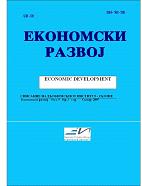Large banks of Macedonia: a comparative analysis
Large banks of Macedonia: a comparative analysis
Author(s): Sasho Arsov, Robert J. BoldinSubject(s): Economy
Published by: Економски институт - Скопје
Keywords: banking system; Macedonia; comparative analysis; bank performances;
Summary/Abstract: The purpose of this study is to examine the three largest banks in Macedonia. These banks, Stopanska, Komercijalna and Tutunska represent at least 70% of all banking activity. The comparative analysis indicates that each of these banks is growing at a healthy rate, and at the same time, continuing their expansion. Net profit rose substantially for Stopanska and Komercijalna. This improvement was also noted in their ROE and ROA figures. The ratios of share capital to total assets and total shareholders’ equity to total assets declined for all three banks moving from 2005 to 2006. The decline is a result of a substantial increase in their total assets. It is noted that some data are missing from Table 3. But, it is the expectation that all banks eventually will provide the necessary data so that a more complete analysis can be made. It is believed that Macedonia has a unique window of opportunity to strengthen its financial infrastructure including its banking system. For Macedonia to become a part of the EU and a fast-moving global system, greater efficiency and competitiveness is required on all fronts. This can be achieved, in part, through consolidation of the industry. The July 2006 merger of two smaller banks to form TTK is a good example. Also, facilitating the acquisition of smaller Macedonia banks by larger foreign banks would be beneficial as noted by the April 2007 acquisition of Ohridska Banka by Societe Generale. They would bring practices that are commonly followed in more developed countries. Further, their operation could be absorbed into an already established system thus eliminating some overlap in operations such as computer systems and administrative functions. Newer technology can help remove existing outdated regulations and other barriers which constrain competition among banks. The influx of larger foreign banks should bring about greater competition and effectively lower interest rates especially to SMEs. It is strongly recommended that all banks in Macedonia audit their financial statements based on the International Financial Reporting Standards. This step will facilitate the comparison of banking data and bring about consistency needed for sound analysis. In the long run all of these steps should prove beneficial to the overall intermediation process and aid in moving the country toward EU acceptance. Using this study as a model, future research will focus on comparing the largest banks in other emerging countries in southeast Europe including Albania, Bulgaria, Bosnia-Herzegovina, Montenegro, Macedonia, Romania and Serbia. It is expected that such research would reveal important differences as well as similarities. This information should be useful to investors, bankers and policy-makers.
Journal: Економски Развој - Economic Development
- Issue Year: 9/2007
- Issue No: 3
- Page Range: 95-112
- Page Count: 17
- Language: English

